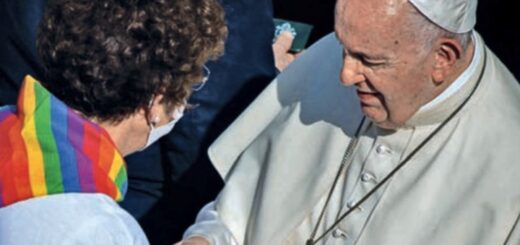Journey between LGBT+ Catholics in China: Father Joseph's mission between faith and exclusion
Interview with Father Joseph, published in the book"BLESSED Are Those Who Mourn: Chinese Tongzhi Catholics' Tales"(Blessed are those who cry: tales of Chinese Tongzhi Catholics) edited by Eros Shaw, Mark Larrimore and Michael Clifton, Editore Sird (Malaysia), 2022, pp. 336-344. Freely translated by the volunteers of the Gionata project
Father Joseph offers pastoral assistance (in China) to China Catholic Rainbow Community Since 2014 However, at the beginning of his pastoral journey, he was not fully immersed in the life of homosexual Catholics.
For this reason, his pastoral experience is particularly precious. We hope that, through this interview and the writings of Father Joseph, more and more priests and shepherds can understand the reality experienced by the LGBT+ Catholics (in China) and feel motivated to offer them adequate pastoral care. Here we report the complete text of an interview granted to a Catholic media, but only partially published. [...]
When did you start offering pastoral assistance to China Catholic Rainbow Community?
My knowledge of the homosexual world derived mainly from books and newspapers, and I thought it was a very rare phenomenon. In the small society in which I live, I didn't even have the perception of their existence. I thought that homosexual people lived only in large cities. In addition, my impression was very negative: in my mind I considered them sinners, people to condemn.
One day, suddenly, a teenager boy I knew well came to me and revealed me openly to be gay. He made me this confidence because he trusted me, after a long period of observation.
He talked to me about his suffering related to love, marriage, family and sexuality. He had lived in a seminar for over a year. It was he who opened a window on a world that I did not know, making me discover an invisible reality to society in general. I introduced me to a group of chat made up of gay Christians.
At the beginning, I did not dare to speak in public and limited myself to listening, trying not to make my identity discover. However, some themes treated irritated me and I could not help but intervene in the discussions. I quoted the Bible to demonstrate that homosexuality was condemned and warned the participants not to speak lightly.
However, my attitude had a negative effect: nobody liked it. During these exchanges, the members of the group discovered that I was a priest, and this aroused in their curiosity. They began to contact me individually, asking me numerous questions, some of which they embarrassed me:
- Father, is he a gay priest? What do you think of homosexuality?
- What is the attitude of the Catholic Church towards homosexual people?
- Father, would he accept us? Is it a sin for a homosexual person to have a relationship?
- I am injured, I'm very unhappy. Do you have any advice that can help me?
- I'm gay. I suffer enormous pressure from my family. My parents push me to marry me. What should I do?
- I have a wonderful partner, but I feel guilty. What should I do?
- Why does God create homosexual people? I don't want to be gay, but I'm attracted to the boys. What can I do?
- I hate the traditional Church, because it condemns homosexuals. What do you think about it?
- How do you meet your sexual needs? Do you really live in chastity?
- Do God want all homosexual people to live in chastity?
- Father, I am married, I have a family and I love my wife and children. But when I see a boy I like, I can't resist. I hate myself for this, but every time I lose control. Could you pray for me?
Through these dialogues, I discovered a life reality that I was not aware of. These people feel a strong need for faith and acceptance by God. The expression "Jesus loves homosexual people" is for them a cry of faith, which reveals their desire for God and welcome. However, in real life they face waste, convictions and discrimination, even within the Church.
Although they may appear strong, they are actually very sensitive and fragile. Often a word out of place is enough to hurt them deeply. This reflects the inner knots they carry with them. On the one hand, they want a relationship, a family, the joy of friendship and family affection; on the other, they see this as impossible because of their homosexuality. Many live isolated, within small groups of homosexual friends, seeking affection and a sense of belonging.
Some fall ill with sexually transmitted diseases or HIV/AIDS. Many come to me and ask me: “Father, why did God create me like that? I don't want to be homosexual, but I can't change my orientation. What should I do? "
Many tell me that my only presence, regardless of my opinions, comforts them. They want a priest who listens to them, who gives them recognition, comfort and some responses. For them it is already very much to know that a priest is interested in them without judging them.
Through these conversations, I have made friends with many of them. I saw how my company helps them to strengthen their faith and understand that God loves them and does not abandon them. Over time, I understood that this mission requires patience and lots of love. I learned to welcome them and love them with the compassion of Jesus.
What do the Church think in China of homosexual Christians?
I would say that the question is wrapped in mystery. In common mentality, talking about homosexuality immediately makes the city of Sodoma think, and the moral judgment tends to equate homosexuality to sin. A pastoral reflection and concrete assistance for these people is completely missing. Priests avoid dealing with the topic [...]
How do you usually provide pastoral assistance to these people?
Modern telecommunications have made the news of my presence easier. The Christian communities homosexual throughout the country have included me in their chat groups. These groups are not only virtual, but represent a lively gay Christian community. They exist in different cities, constituting a real world to itself.
I usually use wechat or qq chats to interact with them. But over time, some people started coming directly to find me to share their experiences with me and seek spiritual orientation. Some of them have even confessed.
Among them were people who have not been confessed for years for fear of being recognized by priests or, even worse, of being marginalized by the Church. Some came to me with their families, taking advantage of a trip, to seek the opportunity to confess.
Other times, when I had to travel for work reasons, I took the opportunity to meet them. I also started participating in their community meetings. Until now I have attended several. Each time I was welcomed with enthusiasm and asked me to speak on a specific theme. In general, I refused, explaining that I was not there to preach, but to be a friend, to share and listen to each other.
Most of them are of Protestant faith, but they welcomed me with great warmth, despite being a Catholic priest. They did not hear any denominational barrier among us. A larger group of Catholics even invited me to celebrate the mass for them. I was able to see how devotion they participated, as well as their Protestant friends.
After the mass, I imposed my hands on them to bless them and saw the tears get off their faces. It was a deeply touching moment. I live near Beijing, so I have more contacts with the community of the capital. Over time, they started to trust me more and more and invite me to their monthly meetings and festive celebrations. Despite having my pastoral commitments, I always try to be available for them. Every time they look for me, I don't repel them. Jesus has never rejected anyone.
What is the general perception of the Chinese Church about homosexual Christians?
I would say that the situation is complex and paradoxical. When it comes to homosexuality, the thought immediately runs to the Bible and history of the city of Sodoma. The collective consciousness still tends to identify homosexuality with sin.
In the church in China there is a complete lack of pastoral studies on this issue, as well as concrete assistance for these people. Priests avoid facing the question. I only heard about a nun who offers pastoral care to a group of gay people in his hometown.
In the past, a priest had allowed homosexual Catholics to hold Sunday meetings in his parish. But he suffered a strong opposition from some parishioners. Negative rumors spread and, in the end, the group was forced to leave.
Have you ever received criticism from bishops or other priests for this ministry?
I often don't speak of my pastoral service in detail, because I know how the Church and the company react to the theme of homosexuality. On some occasions, I discussed the topic with priests and religious, but I noticed that they had a very limited knowledge, derived exclusively from theology books.
They had never deepened the matter nor had they had direct contacts with homosexual people, if not in the confessional or sporadic private conversations.
Their reactions were mostly negative. They have always warned me, telling me they were prudent.
What was the most significant experience in your pastoral mission with homosexual people?
I lived many, but one in particular struck me deeply. There was a young man from the province of Hebei. He was not a Christian, but he was attracted to the Church. We had known each other through QQ and I had perceived that it brought a great pain inside. Often he telephoned me and spoke for more than an hour.
I did nothing but listen and, from time to time, I answered in a few words. One day I heard it was the right time to meet him in person. He welcomed me with great enthusiasm. He was an educated young man, well educated, with a very clear and expressive way of thinking. He worked as a public official and was an extremely sensitive person, with a delicate gestures.
He told me that he could not accept his male body and to have the desire to undergo a gender reassignment intervention. Only later did I understand that his was a case of gender dysphoria, not of homosexuality.
His inner conflict was also reflected in his social life. His family was very proud of him and pushed him to get married. Colleagues, friends and superiors tried to introduce him some girls, but he didn't know how to manage the situation. He did not want to reveal the truth and, at the same time, he felt suffocated by the expectations of others.
His father was increasingly irritated by the fact that he did not get married. It was a matter of "honor" for the family. His mother, on the other hand, loved him deeply and would have liked to keep him next to him. However, he wanted to leave his hometown to escape pressure and live freely, without the weight of social expectations.
We talked for a long time and he felt relieved of my visit. For the first time, he had confided completely with someone. I had no solutions to offer him, but I could listen to him and understand his pain. After our meeting, we continued to feel. He told me about his thoughts, his inner growth and his search for faith.
One day a message wrote to me: "When I let everything go, God gives me a peace that exceeds all expectations. Even if the future worries me, I am learning to rely on him. Jesus said: 'Come to me, all of you who are fatigued and oppressed, and I will give you refreshment (Matthew 11:28). Thinking about these words, my weight becomes lighter. When I entrust everything to God, I feel a peace that exceeds every understanding (Filippsi 4.6-7).
Before I thought I had to rely only on myself. But now I'm learning to pray. I feel like I was born again. This change is a miracle. Life itself is a miracle. And I think there will be other miracles. Thanks for your affection, father. Instead of worrying about me, why don't you bless me to a better future?".
[...] What changes do you think necessary so that the universal Church can offer adequate pastoral care for homosexual people?
First of all, it is necessary to eliminate the rooted prejudices and follow what the catechism of the Catholic Church teaches, that is, that homosexual people "they must be welcomed with respect, compassion and delicacy"(CCC §2358).
Secondly, the Church as a whole should show more attention to them. While many debates on the subject have opened in the European and American churches, the church in China has completely ignored the question.
Third, it is essential to process a specific pastoral plan for them. There should be more studies and research in this area, and priests prepared to face this theme with competence. Since it is a particularly delicate issue, it is necessary to offer a accompaniment with patience and prudence.
In addition, the Church must defend the human rights of homosexual people and promote respect for them, so that they are not discriminated against or treated with hostility.
Another important step is to open an authentic dialogue. The Church must be a place of listening, where people can discern the project of God for them, distinguishing good from evil. The Church should offer welcome and become a family for them, so that they can experience the maternal love of the Mother Church.
Finally, it would be useful to establish a specialized department or assign qualified personnel to provide pastoral care to homosexual people.
As a further step, the Church should encourage homosexual Catholics with a fervent faith to form parish groups, so that they can receive spiritual and human support. With the right accompaniment, they could grow in faith and community life, feeling part of the Church without fear of being marginalized.
*"Are Those Who Mourn: Chinese Tongzhi Catholics' Tales"It is a collection of testimonies that explores the life and faith experiences of the Tongzi Catholics (Chinese term which means" homosexual "or" LGBTQ+"person) in China. A book, which offers a rare and precious gaze on the reality of LGBTQ+ people within the Chinese Catholic Church, highlighting the challenges they face, between discrimination, search for acceptance and tensions between faith and identity.
Through personal stories, letters and reflections, the book tells the path of these people, their inner struggles and their hopes, highlighting the need for more inclusive pastoral accompaniment. This collection has a value not only pastoral, but also social and cultural, as it offers a cross -section of the condition of LGBTQ+ people in the Chinese Catholic context, often little known internationally.
Original text: FR Joseph's Interview with a Catholic Media Outlet






